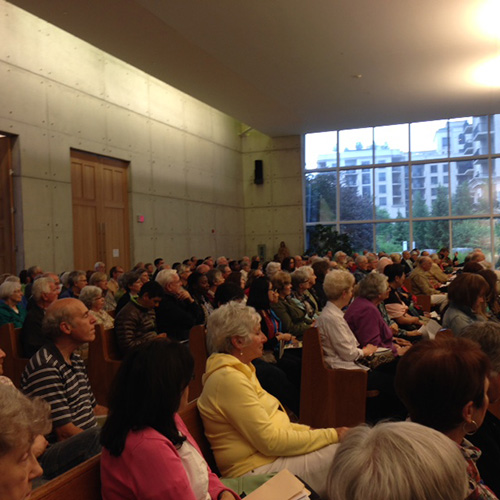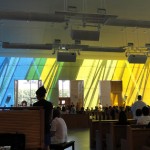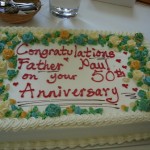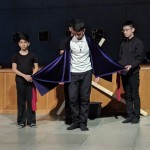Our first reading tells us to lay aside immaturity and live. Lay aside an immaturity that tells us that happiness is found in superficial unattached relationships, fulfillment is found in the things we have, our possessions. Wisdom, a gift of God, invites us to eat the bread she has baked and drink her wine of insight an insight that offers us a deeper meaning of our lives and what life is all about. Wisdom offers us an insight into a deeper understanding of our faith and of our personal relationship with Jesus Christ.
The men and women who listened to Jesus that day so long ago must have thought he’s lost his mind. Jesus told the people, ‘unless you eat the flesh of the Son or Man and drink his blood you have no life in you – whoever eats my flesh and drinks my blood has eternal life, they abide in me and I abide in them.
Eating someone’s flesh and drinking a person’s blood was abhorrent to these people. For them blood was the life source of a person and to tamper with that would be unthinkable. But Jesus will not take back away from his gracious invitation – this is my body, take and eat, this is my blood take and drink. Jesus will not water down his promise,’ whoever eats my flesh and drinks my blood lives in me and I live in them.’
Yet how many times in a day do we feel unworthy of feasting on God because of choices we’ve made, habits we are unable to break or dark spirits we entertain? Yet here we can remember the words of Pope Francis, ‘The Eucharist is not a prize for the perfect but a powerful medicine and nourishment for the weak.’ As I’ve said many times before, when Jesus gave us the Eucharist he gave to us as a gift but over time the church has made it a reward. Receiving Holy Communion is not a question of worthiness it is a question need.
Next Fall at the Synod on the Family a controversial issue will be whether or not divorced and remarried Catholics should be allowed to receive Holy Communion. Put it another way, who should be welcomed and who should be turned away from receiving the life giving Body of Christ?
This is truly a deep pastoral question. I bite my tongue and turn the page when celebrating Mass in another parish and I am asked to make an announcement before communion; if you are not a Roman Catholic, if you do not attend Mass regularly, if you are in an invalid Mass you are invited to come for a blessing but you are not to receive Communion. I find this message a far cry from the gracious invitation of Jesus,’ come to me all you who find life burdensome and I will refresh you. I’m reminded of a solution a priest friend of mine came to when he worried about giving communion to people he knew hadn’t been to church for a long time or couples who came to receive whom he knew to be in irregular marriages. He said that it dawned on him that Jesus is old enough to take care of himself.
Jesus’ invitation to all of us here at this Mass and at every Mass is to take our seat at the banquet table with Jesus and feast on his life!

 Founded by St. Paul of the Cross, every Passionist takes a special vow to spend his or her energies in promoting remembrance of the sufferings of Jesus, the memory of the Cross, and reflection of the meaning of the Cross for the world.
Founded by St. Paul of the Cross, every Passionist takes a special vow to spend his or her energies in promoting remembrance of the sufferings of Jesus, the memory of the Cross, and reflection of the meaning of the Cross for the world.




